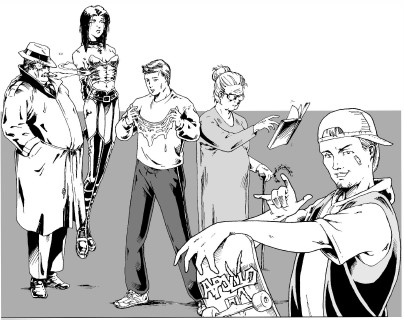"Horror, on the other hand, is fascinated dread in the presence of an immaterial
cause. The frights of nightmares cannot be dissipated by a round of buckshot; to flee them is to run
into them at every turn."
- Sigmund Freud, "The Uncanny"
Horror RPG Tips for Players
Its said that everyone is a natural role-player, and I agree with that. However, based on my experience as
a player, a game master and a writer/designer of Horror RPG materials,
I've come to the realization that not everyone is a
natural “horror RPG player”.
Having an understanding about
what makes a horror RPG work and how to get the most out of the experience is essential. This section of Horror RPG tips is about helping those players who are interested in playing BTS (and contemporary horror RPG's in general) get more out of their game nights and adventures.
Note: This is by no means a definitive list of all the mental tools and skills needed to be a good horror RPG player. Also note that these tips
are based solely on my experience.
Creature Feature Note: The players need time to acclimate to BTS article found on pages 141-145 of Creature Feature has some good character tips to consider as well.
You must be willing to suspend disbelief:
This is rule #1
when playing a contemporary horror RPG. If you're not actively trying suspend your disbelief of what's happening around and to your character (beyond your character disbelieving it all that is) you are doing yourself and everyone at the game table a disservice.
Fortunately disbelieving isn't hard to do as the interactive and imaginary nature of role-playing games means the players & the GM all work together to achieve this. Also, the familiar locations and settings of a contemporary world, and the modern descriptions, discussions and interactions between the Player Characters (PC's) and the Game Master's Non-Player Characters (NPC's) help make everyone's suspension of disbelief easier to accomplish and maintain.
What's most important is that you have “bought into” the story/adventure/setting from the very beginning.
Once you've begun the game night or campaign with your character and have suspended disbelief, its a matter of continuing that disbelief at every game.
This too should be easy and is usually more or less up to the game master to maintain or upkeep. Your GM should always be doing their part to reinforce the contemporary horror setting. A good example: What I enjoy doing at every opportunity is to reintroduce
the suspension of disbelief by starting my game night/session with an short introduction like this:
“When we last saw the investigators, they were traversing a secret underground passage that Jane (the team's Psychic Medium) had discovered under the long abandoned Dunham Mansion after communicating with a Haunting Entity she'd met in the basement. Proceeding the passage, they'd just entered what appeared to be a sort of family crypt. To their surprise, they realized that all of the skeletons are all larger and wider than normal sized human skeletons, as well as being horribly disfigured; its unnerving to imagine what they might have looked like when they were alive. It was then that John (the team's Psychic Sensitive) got the chilling sensation that they were not alone; more specifically... that they were being watched.”
Once reminded, you should already be suspending your disbelief while getting back inside your character's head, thinking about what your character wants to do next.
If you're still having a hard time suspending disbelief, I encourage you to try rethinking about the situation through the eyes of your character.
For example:
Don't throw up your hands in frustration and say “This doesn't make any sense”. Instead,
think out loud through the eyes of your character for the other players and GM to hear and reword your statement with something akin to “This can't be!
How could this possibly be happening?”
Statements and questions like this feels more dramatic and helps you and the other players get into (and stay in) the right state of mind for a more dramatic play style.
I also encourage talking to more experienced players who are good at easily suspending their disbelief and discuss with them how they do it. In my experience, role-players love sharing what works for them and are be happy to help you out (we were all , especially as they probably understand that helping you makes the game more enjoyable for everyone.
Understanding the Nature of Horror RPG's:
For the most part, playing in a contemporary horror RPG isn't much different than playing other genre's. The characters face similar challenges found in other settings, including enemies to outwit or defeat, mysteries to unravel, dangers to overcome, etc. In non-horror games however, the players usually feel that they have all the abilities, skills, talents and tools needed to deal with these challenges, and usually feels like the game master is ultimately on their side.
On the other hand, the big difference of a horror RPG is that “horror” is the intent just as much as it is the content.
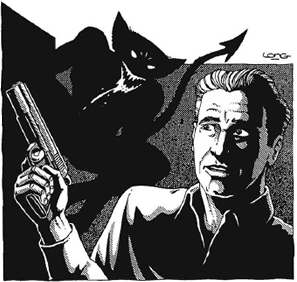 The backdrop of the modern day real world obscures the horrible things that hide in the shadows and corners of said backdrop. Your world is infested with supernatural evil; all of them wicked and cruel beings who instinctively, and often enjoy inflicting horror upon people, including your character. What's worse, their nature of hiding in the shadows means that the most of the world doesn't believe in their existence. At one time your character probably didn't believe in the the supernatural either, blissfully ignoring them until you couldn't anymore.
The backdrop of the modern day real world obscures the horrible things that hide in the shadows and corners of said backdrop. Your world is infested with supernatural evil; all of them wicked and cruel beings who instinctively, and often enjoy inflicting horror upon people, including your character. What's worse, their nature of hiding in the shadows means that the most of the world doesn't believe in their existence. At one time your character probably didn't believe in the the supernatural either, blissfully ignoring them until you couldn't anymore.
Beyond these dreadful creatures, there are also dark magics that distort and pervert the familiar world your character knows and lives in.
And sometimes, for brief moments... the world is distorted beyond recognition. The fears and horrors caused by the unfamiliarity and distortions of your world can bubble up in the dark recesses of your character's mind at any given moment.
In the Beyond the Supernatural RPG, there are evil, horrific, monstrous supernatural beings everywhere, and they want nothing more than to eat you, or tear you to pieces, or play with and dominate your mind and spirit. Your character will face a never ending number of impossible creatures that sometimes seem unstoppable, or even invulnerable, or at the very least they out match your team’s collective abilities. Sometimes, you'll need to deal with situations that feel hopeless, and without help. Your character may feel that no matter what they do, their situation feels doomed.
This is usually one of the hardest aspects of a horror RPG for new players to grasp:
when you play in a horror RPG game, you're ASKING your GM to put your character (and by extension, you) into horrific situations and environments. You're asking the GM to run your character through the proverbial meat grinder; sometimes a literal one. You are here to get scared by all kinds of horrors.
You are willingly going into scary situations.
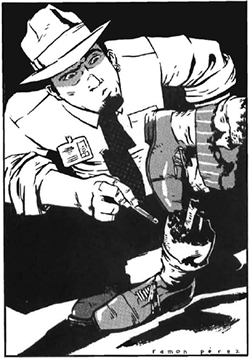 What’s worse, you and your team of investigators are ultimately alone. If you get into trouble, or get lost in the darkness, or deal with things that are beyond you,
What’s worse, you and your team of investigators are ultimately alone. If you get into trouble, or get lost in the darkness, or deal with things that are beyond you,
no one is going to bail you out. You are on your own!
It WILL feel like the GM is out to get you, and to a point that’s true because you’re asking the GM to do so.
You've asked to be thrown into a world that goes beyond the supernatural, and that means you will have to deal with scary situations that’s terrifying and sometimes feels hopeless.
And confronting all these horrors will be relentless. Even if you manage to survive the horrors and resolve the investigation you're a part of today, there will always be another horrific investigation to resolve tomorrow, or die trying.
All that said, the very nature of a horror RPG means that it's never truly hopeless. The characters are never truly victims (unless you're playing in a victim campaign, but that for another tip section). There's always a path or two that leads out of the labyrinth. There's always a ray of hope, even if you, the player and therefore the character, can't see it. It's never hopeless, and it's always worth lighting a candle against the darkness, no matter how bad things may seem. The point is this: the fearful thrill of being scared, or even terrified, or lost, or alone, or desperate, or facing the impossible and all the horrors that come with it IS the goal of the game, not a sign of defeat.
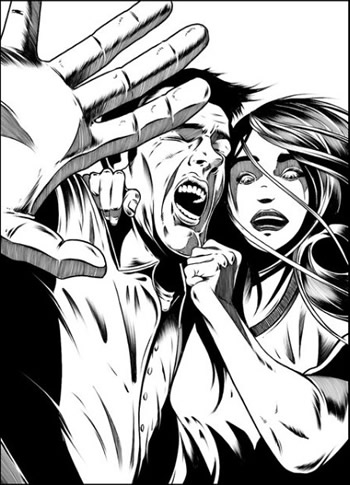 Horror that strikes so close to home and is so personal is very effective, and that is the essence of Beyond the Supernatural; or any contemporary horror setting for that matter.
Knowing what is real and what is not in the modern world is something we all know and understand. That's why when something violates the “rules” of your world, its horrifying! Its scary to have everything you know put into question. But your characters have to not only question it, but they have deal with it, and even confront it; because they are the few who can.
Horror that strikes so close to home and is so personal is very effective, and that is the essence of Beyond the Supernatural; or any contemporary horror setting for that matter.
Knowing what is real and what is not in the modern world is something we all know and understand. That's why when something violates the “rules” of your world, its horrifying! Its scary to have everything you know put into question. But your characters have to not only question it, but they have deal with it, and even confront it; because they are the few who can.
Very few people in your world believe in the supernatural. Those who don't... or can't... well, they simply aren't able to deal with it, and they all fall like dominoes before the authority and might of supernatural evil, every time. They are the true victims in this world... that is, unless your character stands between them and the supernatural.
While it may seem like a small matter, the knowledge that supernatural evil exists is a powerful weapon. And having the courage to confront it, even when your character has no real idea of what they're going up against, and confronting the fears, tensions, anxieties and horrors that comes with them, makes for really memorable experiences and adventures. They also makes for great stories to share later on.
That’s what it means to be a hero in such a unbelievable, yet so familiar of a setting.
That's what it means to be in a world that goes... beyond the supernatural.
 Be willing to flesh out “real characters”:
Be willing to flesh out “real characters”:
This is an aspect that I've seen both players and GM's neglect, and I don't really understand why. What I mean by creating “real characters” is this: spend some time thinking about what and why your character does what they do, including what they've done in their past and where they want to go in the future.
You never know where you’re going until you know where you've been. We all grew up somewhere. We've all got habits. We all have skeletons in our closets. We all have wants and needs. We all have dreams and goals we want to see accomplished some day.
The BTS character sheet already has a section on the back side that aids in this as well as the Rounding out your Character section of the main book, pages 147-158), but you can always add,
or at least consider adding more background details and personality to your character.
This doesn't have to be something you spend hours working on (although you’re welcome to).
You can simply spend a few minutes thinking about what you want your character to be like before you start jotting down notes and details on the character sheet (which is my preferred method).
On the other hand, you can go through the character creation process, and once completed you can work on “character” based on their stats, skills, abilities, and other meta details on the character sheet; in short, you create you character's background and personality based on the sum of the character's attributes, skills, equipment and abilities. With your character set in stone, you can simply write your PC's background based on what's on your character sheet. This way is my recommended method for first time/newer players.
The reason I prefer coming up with a character's background before I even start creating the character is because it gives me an idea of what skills, traits and talents I want the PC to have, which also helps me to expedite the creation process.
Note: You should never have to feel forced to change or alter your character sheet to match your character concept. Sometimes the linear progression of a character's design just clashes with your ideas of what they should have. My response in these situations is to change the background details to match the character info accordingly. Its as fun as it is creative making the background sync up with the character sheet. On the other hand, depending on what your concern is, your GM may be willing to work with you. Example: A player wanted to take the Chemistry skill as a secondary (something she's learning about and doing as more of a hobby than an occupation).
Due to the characters access to academia (community college), this skill being about the basic concepts and understanding of chemical principles, as well as the understanding that she cant take the higher tiered chemistry skills with this as a secondary skill (and she did), I allowed it.
Adding More Personality:
As mentioned earlier, if you're creating a character for a BTS game, there's a section on the back of the character sheet that goes into some details about your PC, but there are other considerations you can consider.
Example personality traits to consider:
What kind of character quirks, ticks, or pet peeves does your character have?
Do they have any distinguishable physical traits? Like freckles, moles, piercing, tattoos and the like? And if they have tattoos, what do they represent to the character?
What are their favorite kinds of foods and drinks? What kind of clothes do they wear?
What are their favorite genres of books, or movies, or songs, or games?
What kind of vehicle does your PC drive or use? Is he a motorcycle guy? Is she a jeep kind of gal? Does he drive around in the same SUV during an investigation that he uses for his small business? Does she abhor having a car and bicycles herself everywhere? Does your character have a suspended drivers license and has to take a taxi? Or an Uber? Or a bus? Or do they rely on their team mates to pick them up and take them everywhere? Imagine your PC going to an auto lot and picking out the kind of car they'd most likely drive.
What are your characters favorite kinds of televisions shows or movies?
Do they influence the character’s perceptions of the normal or the paranormal at all?
How much time does your character train at the gym, studio or dojo?
Note: I require players who load their character’s with physical skills to really get in to bringing up their daily routine as part of their role-playing practice. There’s only so many hours in the day, and the character has to have time to work for a living, eat, sleep and do other things besides work out and exercise all day, unless their employment revolves around it.
Is he/she spiritual in nature? If so, is he/she religious? If so, any particular religion?
Note: While specific religions are not discussed in BTS, your character can select a religion if desired. That said, religious is a very personal and important thing to a lot of people. I recommend you talk to your fellow players and GM about their views on using religion at their game table; while an RPG is nothing more than theatre of the mind, if someone's not comfortable with using religion, its not worth upsetting anyone over a game.
Do you think your character will work well with others?
Why or why not?
Note: As you’re playing in a group of people, its OK to play an antisocial character, but not to where you’re no longer able to be involved in the adventure or the group's activities.
How close is your character to friends and family?
Note: I encourage players to write up some basic notes about friends and family as they can make great contacts (as well as interpersonal relationship role-playing opportunities at times). I've had players who are married with children are have to lead a sort of double life due to investigating the paranormal, and this creates golden role playing opportunities.
Character and Personality Styles:
Another good resource to consider are books and websites that go into
the psychology of people's character and personality styles, and how they communicate with each other.
This is advanced character designing and requires committing more time to the creation process, but its also a lot of fun in my opinion.
One of my favorite books to crack open is
David Keirsey's Please Understand Me II, especially when I’m not sure where to go next while creating a particular character.
Its got a great break down of the four main personality styles and groups (artisans, guardians, idealists and rationals), and those main groups break down into further variants and traits. Each variant offers insight and ideas in which
to help create characters from.
GM Note: I like to reward players who get creative and get into the “character” of their characters, usually with both praise and experience points. I've even been known to reward player(s) who performed a good bit of characterizing or in-game dialogue and/or discussions by giving them bonus experience points right on the spot as opposed to tallying it all up at the end of the night. I do this to help my other players get an idea of what I’m looking for at my game table or what I thought was a fun, unique and/or memorable moment for that character. Occasionally, this bonus XP has enabled player characters to level up in the middle of the game night, and the players get to enjoy updating their sheet throughout the rest of that game session.
So, for you GM’s who haven't been encouraging your players to go further inside their character’s heads, I challenge you to give it a try. You'll be surprised with the results. I've had entire games nights and entire adventures where no combat rolls were made as the players were so busy (and happily) thinking and playing in character as opposed to simply resolving everything by fighting and monster slaying, and these games have been some the most rewarding of my considerably vast Game Master experiences.
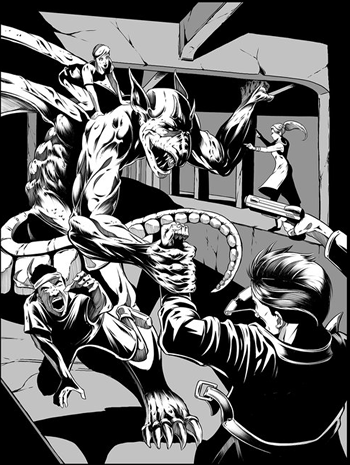 Have a backup character handy:
Have a backup character handy:
This isn't a grizzled old GM thinking negatively, nor am I trying to scare you.
Its just a simple fact that BTS is a horror RPG. Not only are your character’s physical & mental well-being always in jeopardy, but their very lives are under constant threat by the supernatural, amongst other dangers.
Over the course of a game night, your character might deal with monsters, demons, mages, psychics, crazy people, psionics, cults, occultists, ghosts, environmental hazards, illusions, entities, evil
minions, traps, Cthulhu-like beings, local and Federal law enforcement, evil
masterminds (both government & corporate), people doing stupid things and pit bulls.
Now mix all that into a batter of any number of ingredients like questionable player choices, bad dice rolls and/or the GM
getting good dice rolls and/or coming after you with superior numbers, confronting opponents that are stronger than you had expected, and similar ingredients and you
can see that sometimes characters just end up dead.
When your character dies, you generally only have a few immediate options:
Everyone can grind the game night to a halt so you can make a new character, making the other players watch while you do so.
You can sit out the remainder of the game night (or work on a new character) while the other players have fun without you. Note: Admittedly, this can be fun if you’re in the mood to observe the players interact with each other from an outside point of view. I've done this dozens of times over my 30+ years of gaming, and there's a lot to learn by watching how others play the game.
OR, you can have a player character already in the wings, ready to get involved shortly after your previous character has given up their ghost. I always encourage my players to work on a backup character during lulls in the game night as it gives them something to do when the spotlight’s on someone else for the moment, and likely will be for awhile. This also helps keep their head in the game in some capacity, and if any questions come up about designing their character, the input of everyone at the table can be invaluable. I even encourage my players to switch out their characters occasionally, giving the new or backup character time at the table so the other characters are familiar with the replacement when the character shows up.
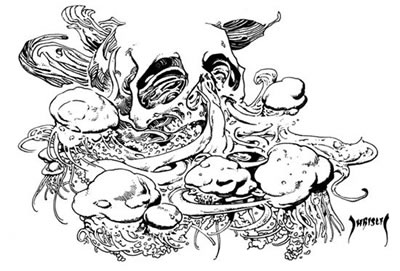 While I’m on this subject, please take your character's death with
dignity and grace. I know it sucks when your character dies. I've lost many a character in my 30+ years; some of them I cherished so much that I was nearly in tears at their passing.
While I’m on this subject, please take your character's death with
dignity and grace. I know it sucks when your character dies. I've lost many a character in my 30+ years; some of them I cherished so much that I was nearly in tears at their passing.
But at the end of the night, its only a game. Maybe ask for a moment of silence,
or say a few words for the fallen comrade, and maybe ask for a quick break to shake off the shock.
But afterwards, get back on the horse and start getting into your new character, looking forward to where the adventure will take your newest paranormal investigator.
Note to GM's: I also encourage you to have pregenerated characters on hand, or even using them in your adventure as NPC's. This way, in the event of a player character dying and the player doesn't have a back up ready, they can temporarily use the NPC till they have a new character. Coincidentally, you can find lots of pregenerated characters in the House of BTS if needed.
There’s no shame in retreating: I’m not sure when or where this became such a dilemma, but I’m puzzled as to how some players just refuse to stop fighting a losing battle, especially in a horror RPG.
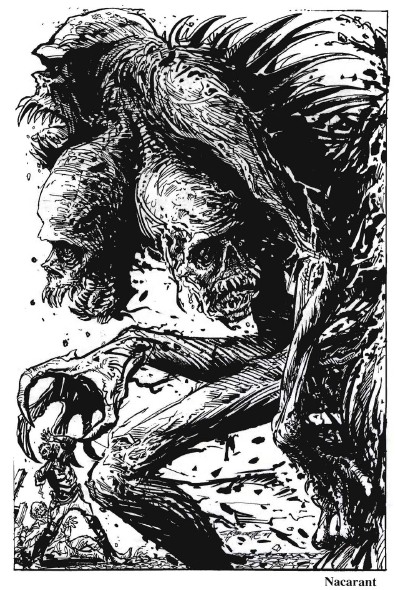 In any horror story, no one is ever truly safe (especially the protagonists).
In any horror story, no one is ever truly safe (especially the protagonists).
So it should come as no surprise that the players will come across a plain bad situation that's too challenging, or sometimes even impossible, to confront with at present.
Sometimes its a case of bad dice rolls, but most often it happens when the PC's aren't fully prepared to handle that particular enemy or situation.
Maybe they didn't do enough research, or maybe they didn't bring the right tools, or equipment, or weaponry.
Sometimes, the GM has a trick up their sleeve or knows something the PC's don't. Sometimes the players misinterpret a tip, or misunderstand a riddle. Maybe they misread the information and/or Intel they gathered. But sometimes... it’s just the nature of a horror RPG.
I admire the enthusiasm and determination of players who yearn to save the day and destroy the monsters, no matter how tough or dangerous they are. But these same players should also know when to quit and strategically withdrawal from the battle. There is a saying that more or less goes like
“Live today, fight tomorrow”; and its a valid and wise saying.
If your team of investigators are dealing with something that you didn't plan on and/or aren't prepared to deal with (like bringing wooden stakes to a werewolf
fight),
get out of the danger zone, regroup,
get the proper equipment and deal with them again later. Beyond the Supernatural is not an RPG about harboring foolish pride. Its not a game where might makes right like most other RPG's. This is a contemporary horror RPG; the advantage will almost ALWAYS be in the supernatural's corner. That’s why thinking critically and strategically, being flexible, using teamwork, and using all the tools, talents, abilities at your disposal are all keys that unlock the doors of survival in horror RPG's.
But on the other hand…
“If you cant go beyond your borders, then push your boundaries”
In virtually all situations, no creature is truly unstoppable! For those who have the Heroes Unlimited book, there is some great info on page 73-74 that goes in the vulnerabilities of juggernauts, and there are a lot of sound ideas that apply when dealing with powerful supernatural beings in BTS.
EVERY supernatural being has weaknesses to exploit. Most avoid being seen by large crowds or going into brightly lit places (or other places where they can be exposed to lots of witnesses). Some beings wont chase anyone further than beyond the borders of their lair. Explosions will knock down and/or throw off or stun most monsters.
Most supernatural beings still needs to breathe air (making large bodies of water a great problem solver). Most supernatural beings, even incredibly strong ones can be temporarily pinned or even trapped behind on under heavy items and equipment like cars or trucks or heavy debris. Supernatural beings can still be pushed or shoved over cliffs, or into pits or down elevator shafts. While most supernatural beings have nightvision, some can be temporarily blinded (or at least impaired) by spells, or by blight lights.
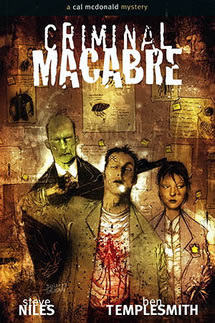 If you HAVE to combat or deal with a supernatural being and you’re not carrying the right equipment for the job,
then compensate with intelligence (and sometimes luck).
If you HAVE to combat or deal with a supernatural being and you’re not carrying the right equipment for the job,
then compensate with intelligence (and sometimes luck).
The majority of supernatural beings rely on their natural abilities over brains, which makes their vulnerabilities and weakness that much more debilitating on them! Even if it’s only to pin or slow down a monster long enough to make an escape, it’s still a weakness to exploit.
To quote private detective Cal McDonald of Criminal Macabre;
“I think one of the key things I've learned over the years is THERE ARE NO RULES when it comes to killing freaks. Sure, some die from a bullet to the head, some by burning, and evidently some by the original superstitions like stakes and silver bullets. The key is to improvise. The key is to adapt to the situation and destroy the threat by any means at hand.”
Quick thought on the Reason for Paranormal Investigation table:
While a lot of players shy away from using it (especially seasoned players), I like the Reason for Paranormal Investigation table on pages 149-150, and encourage you to at least look it over while creating your player character.
To me, there are two reasons to use this table:
1.
It establishes your character's reasons for investigating the paranormal in general.
It determines what drives the character onwards when others would turn and run.
Example: “I'm doing this out of curiosity; and I know what curiosity did to the cat.
But still, all of these dangers and all the mysteries fascinate and intrigue me as much as it all frightens me. I've got to see this through.”
2. Knowing what drives your character onwards in the face of anxiety, or terror, or uncertainly, makes it harder (if not impossible) for your character to flee. At worst they become a reluctant participant.
Example: “I know I should be running for my life right now... but I cant; I'm not built that way. I have to see this through.”
This table can really add flavor to your character, and makes a great fall back when all logic dictates you should run for your life.
Optional Player Group History and Resources:
This article, found on pages 142-146 of the Creature Feature sourcebook, has some good ideas on how your characters all met and how they function as investigators. This table offers good ideal information and details about how your player character met up and how work together. It also offers aspects like what their common goals or interests are.
Avoid the temptation of creating loners and antihero characters:
Another trend that I don't enjoy seeing are players who create loners and antihero PC's, particularly as a way of avoiding internal conflicts or making personal connections with other PC's and NPC's. In my experience, character's with family ties, or have close friends, or has colleagues, allies and contacts they can call upon for help and/or resources are better grounded characters, and are more interesting to play in general. They also make your character more interesting for the other player characters to associate and work with.
Having personal connections gives your character visible people to talk about (or to) during in-game dialogue, and in some cases they provide potential resources.
Example:
“I have no idea how to bypass this level of security, but I've got a hacker buddy who probably does know... I should give him a call.”
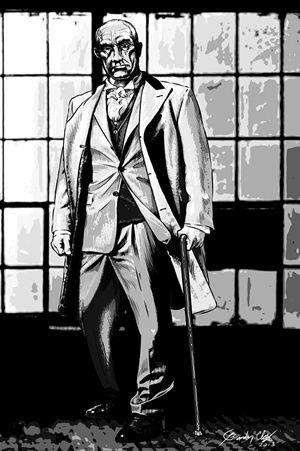 Sometimes its your character's friend's and family that provides the only stability your character can rely on in such a crazy world like Beyond the Supernatural and keep their mental facilities from slipping.
Sometimes its your character's friend's and family that provides the only stability your character can rely on in such a crazy world like Beyond the Supernatural and keep their mental facilities from slipping.
A good example comes to mind when I think about Dr. Edmond Smythe, one of my favorite NPC's to use and play in my home games. He's a Parapsychologist who's often the de facto team lead, as well as a resource of information and guidance when needed. One game night, while in the middle of an in-game conversation about the importance of having contacts and connections, Edmond said something similar to this:
“I've been investigating the paranormal for more than forty years now, and in that time a lot of people have come to me for help and guidance in dealing with the dangers and realities of the supernatural. This is especially true of people struggling to accept that the supernatural is real, or have found themselves in a dark place because of it.
It takes a lot of strength to help so many people, and I find that strength, through my wife. She is the sturdy ledge that allows me to lift others up and out of whatever dark place they're in.”
For those players who create loner characters out of fear of the drama or tension that comes with having personal connections... well, danger and character drama is inevitable in a horror RPG. Embrace it. Make it part of the experience. Friends and family get in trouble ALL the time in every ongoing story you read or watch because the drama works. Rescue Mission based adventures where the characters have to help or rescue a contact or a personal relation are some of the most memorable adventures to have.
From the Rifts: Good Role-Playing
Palladium pals Big Will Johnson and Carmen Bellaire have been producing videocasts on Youtube about a variety of Palladium Book titles. In the video I added below, the subject is “Good Role-Playing” and offers some great thoughts and ideas on the subject.
Check it out!
More tips coming soon...
The House of BTS is a fan site and all of it's content is free. However please consider a small donation
as it will help maintain the site and help provide new information, artwork and materials.
As the Host of the House, I thank you for your generosity!

